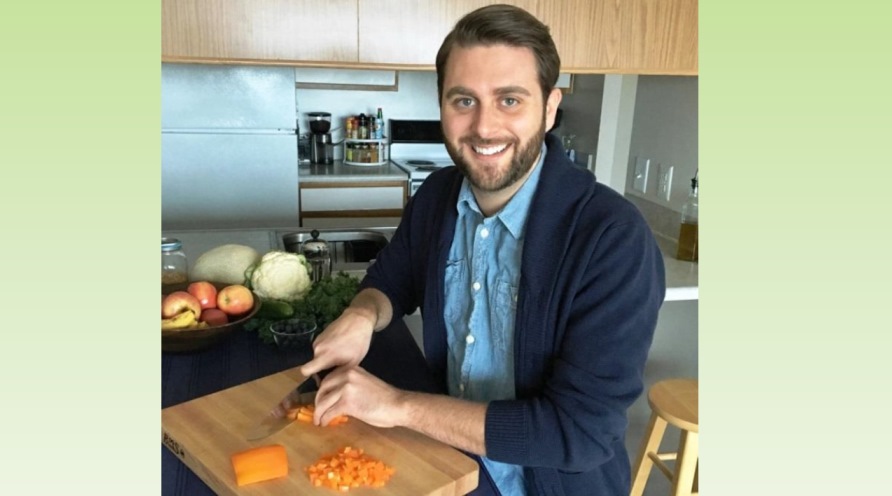
(Class of 2018 medical student Nathan Wood will lead Culinary Nutrition: A Practical Course).
A new optional course debuting next month at the Wayne State University School of Medicine has some medical students trading in their scalpels for kitchen knives.
First-year students taking the required Clinical Nutrition course at the school may also enroll in Culinary Nutrition: A Practical Course, designed by third-year medical student Nathan Wood to serve as an optional supplement to the Clinical Nutrition course co-directed by Mary Width, M.S., R.D., and Tonia Reinhard, M.S., R.D., F.A.N.D., senior lecturers in the WSU College of Liberal Arts and Sciences.
The pilot course will give students the basic tools necessary to teach their patients how to cook healthy meals, an essential component of maintaining health and preventing chronic illness, Wood said. Interested students were asked to submit an application explaining why they wanted to attend the course, which now has a wait list.
Twenty students will meet from 6 to 8 p.m. March 1, 8, 15 and 22 at the Food Science Lab in Science Hall on WSU's main campus. Wood will serve as course director and instructor. Select second-year medical students will contribute as culinary assistants.
"No matter their level of culinary and/or nutritional expertise, I think every medical student could benefit from this course. With the increasing force behind the natural and alternative medicine movements in America, patients expect doctors to know more and more about food and the way in which it can augment disease states," Wood said. "I've heard many anemic patients ask their primary care physicians to suggest natural sources of iron found in our food supply. Although beef provides an abundant source of heme iron, which is readily absorbed by the human body, most doctors would agree that advising a patient to eat more red meat is not wholly advisable. However, this is often the response that patients receive. I hope to address this knowledge gap in 'food as medicine' that currently exists between physicians and nutrition experts by beginning with this course right here in our community."
Each session will include culinary theory, such as basic recipe structure, and culinary technique, including food safety, knife basics and cooking techniques. Each session will also feature a nutritional component.
Reinhard serves in an advisory capacity for the course, reviewing the curriculum, lesson plans and additional materials.
"I imagine physicians, and oddly enough, many dietitians, can talk about health issues such as saturated fat and antioxidants, but they may not be able to answer practical questions posed by patients and clients if they don't have much experience in food purchasing and preparation," she said. "Additionally, if physicians improve their own health and wellness, they can better serve as role models to patients."
Interactive discussions, hands-on learning, small-group work, live demonstrations and short lectures will guide students, who will prepare and cook one recipe per session.
"I want the doctors of tomorrow to know how to cook, not only so that they can enjoy healthy eating personally and with their families, but also so that they can practically counsel their patients on how to prepare tasty, nourishing food for themselves," Wood said. "I am excited to have developed this curriculum and be partnering with the Health and Wellness Committee and Food Medicine student organization at the School of Medicine to present it to my fellow medical students here in Detroit, where lifestyle interventions have the capacity to impact the lives of so many patients in the community."
Recipes, developed by Wood, include Shakshuka with Lacinato Kale and Whole-Grain Toast; Baked Mushroom and Butternut Squash Macaroni and Cheese; Citrus Farro with Roasted Summer Vegetables and Chicken Breast; and Steamed Lemon-Herb Salmon with Fennel and Asparagus.
"They were strategically devised to promote the use of specific culinary theories and techniques, ingredients and nutritional goals. In addition, the four recipes to be made in the course represent dishes from each of the four seasons to exemplify cooking with local, seasonal ingredients," Wood said.
Wood's mother taught him how to bake at a young age. By high school, he was cooking the majority of the family's dinners thanks to a healthy appetite for the Food Network. In college, the then-undergraduate served as food critic for the student newspaper at the University of Michigan. As a WSU medical student, Wood began volunteering for the nonprofit organization Cooking Matters as a culinary instructor. He recently audited a class at the International Culinary Center in New York.
He plans to expand the course capacity in the future based on student feedback from this year's pilot class. For more information, email nwood@med.wayne.edu.